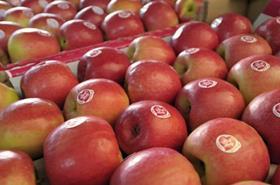
Pink Lady’s trademark owner Apple and Pear Australia Limited (APAL) is finally making marketing inroads into one of its biggest production bases, Brazil.
While Cripps Pink – the variety sold as Pink Lady – has been grown in the South American country for ten years, the highly non-segmented nature of the market has made it a tough one to crack.
“Fuji and Royal Gala make up 95 per cent of what they do,” Garry Langford of Coregeo Australia, apal’s intellectual property division, explains.
“We have focused on developing the brand in other markets, mainly Europe, with Brazil primarily an exporter of the apple.”
Langford believes the dynamics of the Brazilian market are slowly beginning to change, suggesting the country’s growing middle class is creating more demand for variety in the market place.
Hoping to position itself at the forefront of this retail awakening, apal has invested in a number of marketing programmes, including a successful Valentine’s Day campaign centred around in-store promotions and point of sale materials.
“It didn’t take people long to stop and ask ‘what is that?” Langford says. “On the back of these sort of promotions we are able to generate more interest when we explain Brazil is one of our production bases. “It’s all about creating that initial awareness.”
APAL has worked closely with Brazil’s major retailers to create its market development strategy. Langford says the approach is not new but believes it is highly applicable in Brazil’s case.
“With the apal business model, we own the brand but we go to places and let them adapt it to best fit their own market,” he explains.
“Stores in Brazil have a good feel for their customers. Things aren’t cheap in Brazil either, so it’s vital that quality matches expectation. We feel that’s what our brand does best, so it’s important we get the development strategy right.”
Much of Pink Lady’s success on the international market has been built on its slightly acidic taste and its unique colour, which has captured the imagination of consumers in the UK and the US in particular.
While Langford says the brand, and the apple’s characteristics still have a way to go before they capture the same attention in Brazil, he remains optimistic.
“It will take a little while,” he concedes. “The thing with markets like the UK, the taste and texture immediately appealed to what the market was demanding.
“The challenge with Brazil is the market is not well segmented. One thing in our favour is there is a local supply there, so logistically it makes it easier to meet demand. Like all of our markets we feel if the fruit is in the right condition, it will sell.”
Pink Lady and the flowing heart logo are trademarks of APAL in over 80 countries worldwide.



